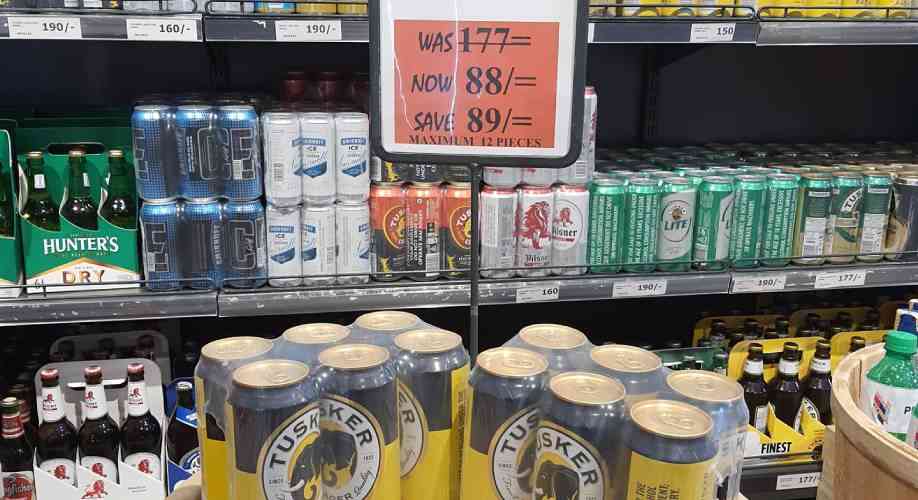News
NACADA Denies Alcohol Sales and Advertising Ban Amid Public Outcry

Nairobi, Kenya – July 30, 2025 — The National Authority for the Campaign Against Alcohol and Drug Abuse (NACADA) has dismissed widespread reports suggesting that it has imposed an immediate ban on alcohol advertising, online sales, home deliveries, and celebrity endorsements.
The clarification comes amid public outrage triggered by media reports and an official directive that appeared to outlaw a range of alcohol-related activities, including online advertising, supermarket sales, and home deliveries.
In a statement released following the launch of the National Policy for the Prevention, Management, and Control of Alcohol, Drugs, and Substance Abuse (2025), NACADA CEO Dr. Anthony Omerikwa emphasised that no such bans are currently in force.
“This is a national policy, and contrary to reports suggesting that NACADA has banned certain practices such as alcohol advertising, online sales, home deliveries, and celebrity endorsements—we wish to emphasise that no bans have been introduced,” said Dr. Omerikwa.
However, confusion arose after reports by The Standard revealed a directive outlawing online promotion and marketing of alcoholic beverages, as well as their sale through vending machines, supermarkets, restaurants, petrol stations, beaches, and parks.
Even home deliveries and hawking of alcohol were reportedly prohibited under the new rules, sparking a wave of criticism from both the public and industry stakeholders .
Reactions on social media were swift and divided. Some Kenyans lauded the move as bold and necessary to curb alcoholism.
But many others, including professionals and liquor traders, slammed the proposals as unrealistic, misguided, and ripe for abuse.
“This is lazy thinking. Alcohol consumption is driven more by psychological and behavioural factors than availability. This will only fuel illicit brewing and undesignated drinking dens,” said one X (formerly Twitter) user, Sitati Wasilwa.
The Medium Liquor Traders Association (MELTA) also issued a strongly worded statement, warning that the policy in its current form could devastate small businesses, increase unemployment, and worsen the illicit alcohol crisis.
MELTA Chairperson Francis Mbogo criticised the lack of engagement with stakeholders and termed the proposals “sweeping” and “punitive” .
In response, NACADA clarified that the measures outlined in the policy are recommendations, not legally binding rules, and are meant to guide future legislative and regulatory action.
“Their inclusion aims to initiate legal and regulatory reviews, subject to proper procedures,” said Dr. Omerikwa, adding that any move toward enforcement would undergo public participation and parliamentary scrutiny.
The authority further announced plans to establish a multi-sectoral implementation framework involving government agencies, civil society, the private sector, and the public to guide the policy rollout.
NACADA urged the public to treat the document as a roadmap, not a set of regulations, and advised Kenyans to rely on its official website — http://www.nacada.go.ke — for accurate updates.
“NACADA’s goal, as clearly outlined in the policy, is to protect our youth from the dangers of alcohol and substance abuse, reduce related harm, and foster a healthier, more productive society,” said Dr. Omerikwa.
As debate continues to swirl, the authority faces the challenge of balancing public health priorities with economic realities, regulatory clarity, and stakeholder trust.
Kenya Insights allows guest blogging, if you want to be published on Kenya’s most authoritative and accurate blog, have an expose, news TIPS, story angles, human interest stories, drop us an email on [email protected] or via Telegram
-

 Grapevine2 weeks ago
Grapevine2 weeks agoAlleged Male Lover Claims His Life Is in Danger, Leaks Screenshots and Private Videos Linking SportPesa CEO Ronald Karauri
-

 Grapevine1 week ago
Grapevine1 week agoRussian Man’s Secret Sex Recordings Ignite Fury as Questions Mount Over Consent and Easy Pick-Ups in Nairobi
-

 News5 days ago
News5 days agoTHE FIRM IN THE DOCK: How Kaplan and Stratton Became the Most Scrutinised Law Firm in Kenya
-

 Investigations1 week ago
Investigations1 week agoMulti-Million Dollar Fraud: Three Kenyans Face US Extradition in Massive Cybercrime Conspiracy
-

 Economy6 days ago
Economy6 days agoIran Demands Arrest, Prosecution Of Kenya’s Cup of Joe Director Director Over Sh2.6 Billion Tea Fraud
-

 Business6 days ago
Business6 days agoA Farm in Kenya’s Rift Valley Ignites a National Reckoning With Israeli Investment
-

 Africa1 week ago
Africa1 week agoFBI Investigates Congresswoman Ilhan Omar’s Husband’s Sh3.8 Billion Businesses in Kenya, Somalia and Dubai
-

 Business2 weeks ago
Business2 weeks agoM-Gas Pursues Carbon Credit Billions as Koko Networks Wreckage Exposes Market’s Dark Underbelly



















